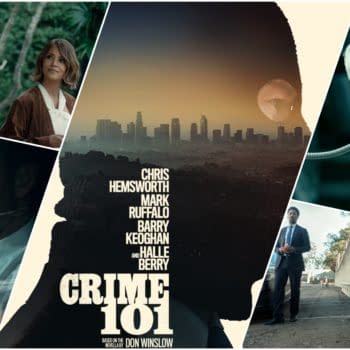Posted in: Movies, Recent Updates | Tagged: dawn of the planet of the apes, disney, Earth to Echo, edge of tomorrow, entertainment, film, godzilla, guardians of the galaxy, legendary, lucy, marvel, radio free albemuth, science fiction, snowpiercer, sony pictures, space pirate captain harlock, teenage mutant ninja turtles, the amazing spider-man 2, the giver, The Purge: Anarchy, transformers: age of extinction, x-men days of future past
Our Summer of Science Fiction Movies – Look! It Moves! By Adi Tantimedh
Adi Tantimedh writes:
While the studios have been lamenting that this box office earnings this summer have been in a slump, mostly due to most of the movies being crap and people not bothering to see them, the most interesting thing about this season is that there seems to be more Science Fiction movies this summer than the last few.
The internet has run tedious articles about how the summer movie season of 1984 was one of the great summer seasons for the number of movies that have since become classics, but this summer is noted for the huge number of Science Fiction movies released, from the terrible to the sublime. If you take them at once, they paint a tapestry of current obsessions and anxieties – or at least the anxieties of commercial filmmakers and screenwriters –on top of what's considered commercially viable in the current era. To judge the box office success (or lack thereof) of these movies are a good sign of what audiences might be feeling.
The Amazing Spider-Man 2 kicked off the summer. It's from a comic book, but all the crazy science that drove the plot makes it science fiction. Spider-Man has always been a science fictional allegory for teen geek angst, even if it had an overstuffed plot because the studio was trying to establish a franchise more than just tell a good story. I can't help feeling it's really about the decadence of big budget filmmaking.
Godzilla started out originally as a metaphor for the atom bomb and nuclear power in Japan before turning him friendly to stand for safe nuclear power in the 1970s. The new Hollywood version domesticates him even further by turning him into a metaphor for American Interventionism.
X-Men: Days of Future Past is a smorgasbord of Science Fiction tropes adapted from the comics: you get mutants with superpowers, giant killer robots and time travel. It's also filled with the Hollywood obsession with correcting past mistakes and resetting the clock to get some redemption.
Edge of Tomorrow is apocalyptic Japanese Science Fiction, Groundhog Day in war, filtered through Hollywood, which means it's funnier, and being Hollywood, is much less fatalistic, offering its hero the chance to not only win the war and save the world, but also regain his status and success, not to mention get a chance to land the girl. Where the original Japanese novel was about sacrifice and soldiering on, the American adaption is about learning life lessons and then winning at Life.
Transformers: Age of Extinction is probably another nail in the coffin for The Death of Cinema, its sound and fury signifying explosions and wholesale destruction of real estate as escapist spectacle. It also seems to be about Mark Wahlberg as a useless, ineffectual single dad who gets to reassert his masculine power when he gets a big penis-gun-sword.
Earth to Echo is a pointless rip-off of E.T. with a CGI robot alien that a bunch of kids try to help, shot in the already-over trend of found footage movies. It tries to parallel that main plot with a theme about childhood's end, but feels so inconsequential that nobody went to see it. If anything, the found footage style is an indicator of a society where everyone is always watching each other and themselves, needing to be caught on camera in order to feel like they exist.
Radio Free Albemuth is the indie Science Fiction movie with big political ideas adapted faithfully from a Philip K. Dick novel, self-distributed by the makers as a summer outlier that will have a growing cult in the years to come. Its message of fighting fascism and oppression is more explicitly political than blockbusters would go.
Snowpiercer is the other Science Fiction outlier, a political allegory about class warfare and one of the best-reviewed movies of the year, the one movie that's gotten the most buzz this summer other than Guardians of the Galaxy. The first movie to successfully avoid Harvey Weinstein's attempt to recut it and actually be released in the full director's cut for the maximum impact of its political message. Like Radio Free Albemuth, it's about the need to fight fascist oppression and forge a new society.
Dawn of the Planet of the Apes is yet another piece of metaphorical Science Fiction about bigotry and warfare. Personally I found it incredibly predictable, but it takes its central idea about irreconcilable differences and distrust to create a universal allegory for just about any real-life global conflict you want to apply it to. The reoccupation with war and a general pessimism makes it consistent with the general prevailing mood of doom.
The Purge: Anarchy considers its hugely flawed and reactionary premise of a state-sanctioned day of murder and mayhem to keep the generation population in check by satiating their anger and bloodlust, and prevent a violent revolt against the government and the rich. Ultimately it's very neocon in its belief that people are evil and would commit murder if there weren't laws to stop them.
Lucy is Luc Besson's return to directing a big action movie about a hot blonde starlet getting to walk over everyone the moment she gets power and then getting more power so she can control all Time and Space to get revenge on exploitative men. It seems to need dumb science to give her power, but bad science fiction is still science fiction.
Guardians of the Galaxy is a new space opera that's not based on Star Wars or Star Trek, but the Marvel comic. The most fun movie of the summer, it's reminiscent of Farscape, only without the S&M subtext and a lot less Australians wearing bondage gear. It is, of course, another assertion of primacy of the happy-go-lucky American dude in space, but we're all used to that message by now. For once the heroes in space are not in the military, but they do become accepted by the military and government for saving the world, so it's more conservative in outlook than the more paranoid and anarchistic ethos that drove Farscape. With its self-aware pop culture jokes, it's like a new puppy: charming and eager to please, and ready to earn its affection. It's Science Fiction as pop candy.
Teenage Mutant Ninja Turtles tries to straddle the light touch of the original kiddie comic and cartoons with big 9/11-style explosions that Hollywood seems to think they're obliged to include in every action movie these days. And of course, the bad guy has to have a big apocalyptic plan rather than just commit crimes. Even a kid's series like this one has to be rejigged to include disaster porn.
The Giver is the obligatory adaptation of a Young Adult novel that every movie season seems to demand, though this might feel like old hat after the success of the Hunger Games movies. A rather generic and derivative story about a future society that's regulated and oppressed with seeming peace and perfection until a rebellious teenager discovers the truth and works to bring it down. As generic as the movie and story is, it focuses on teen alienation, the Gnostic suspicion that the world is lying to you and the fantasy you are the only one who can bring it all down. It's a kind of fake rebellion movie since its attitude is still generally conservative at heart, as well as leached of any real political backbone.
And finally, while it's not a theatrical release, the new Space Pirate Captain Harlock premiered on Netflix in the US and UK on August 1st, the same day Guardians of the Galaxy opened in the cinemas. It's the other space opera adapted from a comic but being Japanese, it's obsessed with the apocalypse, the end of the world and redemption for messing up and ending the world. Taking place in the far future where Humanity took to the stars, only to be forbidden from returning to Earth because its limited resources can no longer sustain the booming populations that flourished in space, the space pirate hero leads a rebellion against a decadent, corrupt Earth government as he plans an act of terror to expose them and the truth they've hidden about Earth. All of this is an allegory for class tensions in Japanese society as people trust the ruling parties less and less even as they feel helpless against it. It's also humourless, ponderous, self-important, existential and a piece of white elephant art, but it has the prettiest CGI you'll see outside a video game. Come on, you know you want to see a pirate spaceship use is skull masthead as a battering ram against government warships.
You could also dissect all the terrible comedies that bombed this summer and other movies opening this summer to get a sense of where the zeitgeist is in summer 2014, but it's only the Science Fiction genre that explore the big themes and big ideas. This is why studying movies are never dull, even the bad ones.
Future movies are now at lookitmoves@gmail.com
Follow the official LOOK! IT MOVES! twitter feed at http://twitter.com/lookitmoves for thoughts and snark on media and pop culture, stuff for future columns and stuff I may never spend a whole column writing about.
Look! It Moves! © Adisakdi Tantimedh






























